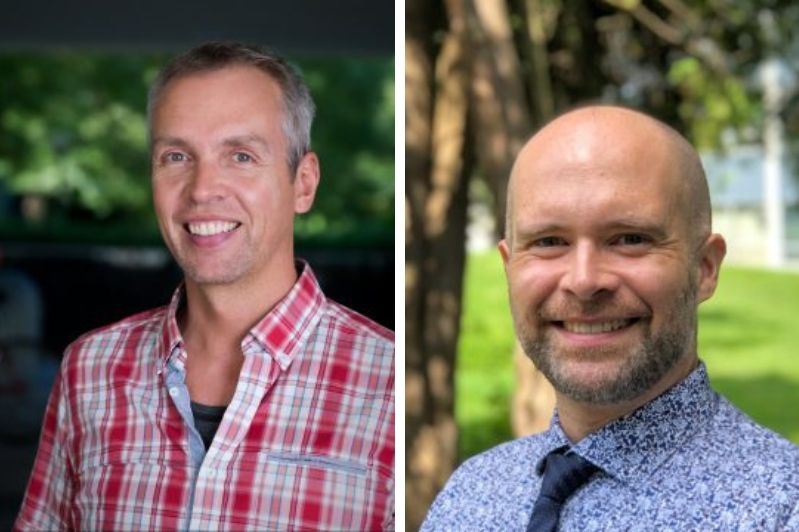
In Spring 2023, two CENES colleagues won the prestigious Killam Teaching Prize: Kyle Frackman (German and Nordic programs) and Florian Faller (German program).
The Killam Teaching Prize is awarded annually to faculty nominated by students, colleagues and alumni in recognition of excellence in teaching. Recipients are recognized at the graduation ceremonies each year. We talked to Frackman and Faller about what the recognition means to them personally.
CENES: There are a lot of prizes and awards, but what does it mean to you personally to receive this particular recognition?
Frackman: I know many colleagues and friends at UBC who have received the Killam Teaching Prize. I respect their approaches to teaching and mentoring students, so it means a great deal to be able to count myself among their ranks. I take a lot of pride in my teaching and my work with students, so I’m grateful for the recognition that this award signifies.
CENES: What is your first memory of “being a teacher”? Can you give a few examples or details about how things have changed for you since then?
Faller: In the late 90s, I was a student teacher in a German high school, lacking confidence, scared by upcoming demonstration lessons, and feeling poorly prepared by my university education. My voice could not “fill a classroom”, so I took lessons with a singing teacher, which was very helpful. A bit of an uphill battle, but I learned a lot from my mentors and other teachers, and I liked the challenge and interaction with students. To better understand their experiences in my classes, I created my own feedback form for them, which was not usually done at the time.
CENES: How did you get started as a German teacher?
Frackman: I started learning German in grade 10. By grade 12, after studying at a high school in Nürnberg in a program sponsored by the German government, my proficiency had advanced pretty far. My high school German teacher, Jo Sanders, encouraged me to try out teaching beginning German students. I think I taught them to talk about occupations. “My father is a mechanic,” and that sort of thing. She invited me back when I was an undergraduate student, and I went on to study pedagogy in addition to German.
CENES: We’re all always growing as teachers over the course of our lifetimes. Where do you hope to grow from here?
Frackman: Someone told me once that “good teaching is stealing.” My own teaching style is an amalgamation of things I have learned from the teachers I have admired over the years. I want to continue learning how to improve my teaching and how best to support students, especially as the conditions for learning in higher education keep changing.
Are there any popular ideas about teaching that you actually disagree with? Why?
Frackman: Lectures have gotten a pretty bad (or at least mixed) reputation, probably because it’s so easy to do them poorly. Like many other things, lectures have a place in the teacher’s toolbox. The best lecturers I have heard, and the ones whose styles have informed my own, use components like humour, images, sounds, movement, interactivity, and breaks to make them more successful.
What do you think matters to students most?
Faller: Students need to feel that you actually care about them and their learning, that you are on their side rather than on the institution’s side. Building trust and creating an atmosphere where students feel comfortable to make mistakes will make students more tolerant for your own shortcomings as an instructor. All this is only possible in small classes of no more than 30 students. One example / basic strategy is learning the names of my students quickly.
CENES is terribly proud of our colleagues’ achievements. We’re particularly grateful for this special recognition of Frackman and Faller’s decades of work on behalf of UBC students!


